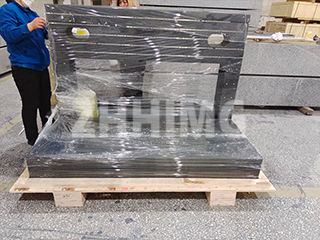Granite, a common igneous rock known for its high hardness, corrosion resistance, and durability, plays a vital role in architecture and interior design. To ensure the quality, stability, and precision of granite components, granite inspection platforms are widely used in industrial quality control processes.
These platforms provide a stable and ultra-flat surface for accurate testing and measurement. Below are the primary applications of granite inspection platforms in modern industries:
1. Physical Property Testing
Granite’s physical properties—such as density, porosity, water absorption rate, hardness, and elastic modulus—are critical for determining its suitability for construction or engineering purposes.
Granite inspection platforms support a range of testing methods to accurately measure these parameters under controlled conditions.
2. Chemical Composition Analysis
The chemical makeup of granite affects its color, texture, strength, and long-term durability. Using tools like X-Ray Fluorescence Spectrometry (XRF), inspection platforms help identify the elemental composition of granite, ensuring that the material meets project specifications and environmental standards.
3. Structural Stability Testing
In structural applications—such as columns, flooring, and ceilings—granite must demonstrate high stability and resistance to slippage. Granite inspection platforms can support tests like the Skid Resistance Test (e.g., SCT method) to evaluate the stone’s performance under stress and load-bearing scenarios.
4. Surface Quality Inspection
Surface quality directly impacts granite’s aesthetic appeal, wear resistance, and usability. Inspection platforms are used with optical microscopes and scanning electron microscopes (SEM) to assess surface features such as micro-cracks, pits, roughness, and scratches.
5. Edge Finishing Inspection
Granite edges are often processed to meet specific architectural or design needs. Granite inspection platforms provide a reliable setup for evaluating edge treatments using magnifying tools or digital microscopes, helping ensure each piece complies with design and safety requirements.
Why Granite Inspection Platforms Matter
Granite inspection platforms serve as essential tools in verifying the quality, precision, and usability of granite materials. By evaluating physical, chemical, and structural properties, manufacturers and builders can ensure optimal material selection and application.
These platforms not only improve product quality and consistency, but also reduce waste and production errors in sectors such as:
-
Construction and architecture
-
Stone processing and fabrication
-
Precision engineering
-
Quality assurance labs
-
Granite slab and tile manufacturing
Key Advantages of Our Granite Inspection Platforms
-
00 Grade Accuracy: Ultra-flat surfaces for high-precision measurement
-
Thermal Stability: Resistant to temperature fluctuations
-
Non-Magnetic and Corrosion-Free: Ideal for sensitive environments
-
Custom Sizes Available: Tailored to your production or laboratory needs
-
Durability: Long service life with minimal maintenance
Post time: Aug-04-2025

